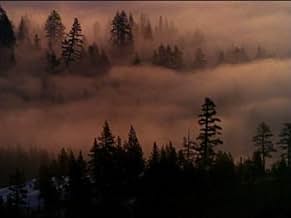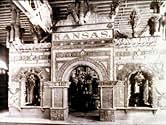The West
- Miniserie de TV
- 1996
- 1h
Documenta la expansión de los Estados Unidos en los vastos territorios del oeste americano.Documenta la expansión de los Estados Unidos en los vastos territorios del oeste americano.Documenta la expansión de los Estados Unidos en los vastos territorios del oeste americano.
- Premios
- 1 premio ganado y 2 nominaciones en total
Explorar episodios
Opiniones destacadas
This documentary was incredibly well done and well researched. A lot of very sensitive white people on IMDB have been leaving reviews about how this documentary is a "revisionist" history and framed as all white men are evil. As a guy who teaches history I find it fascinating that so many people believe whatever version of history they learned growing should be the only version that future generations learn about. History is something that can be interpreted differently by different generations. Just because you were raised with some baby boomer propaganda filled version of American history does not mean that any other version is "revisionist" or "PC."
10AlexMI
Unique, amazing, massive project thoroughly documenting the expansion of the United States into the vast territories of the American WEST. Brutally honest, sympathetic insight into the fall of the many Native American peoples... some of the material is painful, sometimes bleak, but an absolute MUST SEE for any feeling person with even a passing interest in the history of America. Outstanding photography and the classic Ken Burns look & feel (executive & senior producer), but with director Stephen Ives' own insightful point-of-view. This series ranks right along side Burns' "Civil War" in scope and depth, IMHO. See it anyway you can, then demand the set on DVD! (DVD not available at this writing).
This documentary mini-series does a decent job of covering such a huge, complex subject in 9 episodes (about 10 hours of time). I like that appropriate focus and time given to American Indians, who played such a crucial role in the story, and to other groups like Latinos, blacks, and Chinese immigrants who played vital roles, as well.
(I'm also offended by a number of reviewers who complain that too much screen time is given to Indians and minorities. These same reviewers complain that whites aren't credited enough for their courage and virtues in subduing the "wild west" and "civilizing" the Indians. The irony is that these reviewers are the very sort of racist people who caused so much trouble and misery while the real history was being played out!)
On the whole, I do recommend watching this mini-series.
(I'm also offended by a number of reviewers who complain that too much screen time is given to Indians and minorities. These same reviewers complain that whites aren't credited enough for their courage and virtues in subduing the "wild west" and "civilizing" the Indians. The irony is that these reviewers are the very sort of racist people who caused so much trouble and misery while the real history was being played out!)
On the whole, I do recommend watching this mini-series.
I had looked forward to the series as coming from a master of the documentary form. After all, Burns set in motion several documentary devices that have been widely copied since, such as first-person voice-over narration and having the narrator sign off each spoken part with his or her name. The Civil War series was truly an achievement.
This thing, however--
It amounts to a chapters-long indictment of Europeans that verges on racism. It emerges after a while that the only good whites are dead whites. It's true that there was much brutality in white settlement of the west, and that horrible crimes were committed, usually unthinkingly, and many of them by whites. But is there really nothing more to the story than white-folks-bad/red-folks good? With a little effort, Ken Burns might have found, oh, I don't know, at least one good white person. Or, rather, one good white person who wasn't immediately tarred and feathered by his redneck fellows.
It's as if you were to tell the story of World War II and focus on nothing but the fact that the American armed forces were rigidly segregated at the time. Oh, wait, that one's probably Ken Burns' next.
This thing, however--
It amounts to a chapters-long indictment of Europeans that verges on racism. It emerges after a while that the only good whites are dead whites. It's true that there was much brutality in white settlement of the west, and that horrible crimes were committed, usually unthinkingly, and many of them by whites. But is there really nothing more to the story than white-folks-bad/red-folks good? With a little effort, Ken Burns might have found, oh, I don't know, at least one good white person. Or, rather, one good white person who wasn't immediately tarred and feathered by his redneck fellows.
It's as if you were to tell the story of World War II and focus on nothing but the fact that the American armed forces were rigidly segregated at the time. Oh, wait, that one's probably Ken Burns' next.
This documentary directed by Steven Ives (not Ken Burns, as several of the reviews in this thread inaccurately state) is a sweeping epic that showcases the salient moments in the settlement of the American West. Using historical documents, academic narratives, scenes of stunning natural beauty, and original photos and documents, "The West" is a gripping and historically accurate overview of this great (and, at times, terrible) period in American history.
The reviews that complain that this series is somehow anti-American suffer from two flaws. The first is selection bias. Parts of "The West" feature cruelty and brutality, usually at the hands of white settlers. But to focus on this as the only distinguishing feature of the film ignores the numerous instances in which white people--e.g., Sam Houston, Brigham Young, Joseph Meek, just to take a few--are portrayed quite deservingly as heroes. Nor are all Native Americans portrayed in a positive light; the film also makes the point that the Lakota Sioux's claims to the Black Hills territory as their ancestral lands are somewhat ironic because the Lakota conquered the Kiowa and other tribes, driving them out of that area in conquests very similar to the Americans' accession of the West.
The second error is simple oversensitivity. The history of the West is both a great and terrible story. It's great because it epitomizes the expansive American spirit that binds us together as a nation. It's terrible because in acquiring the West, we (Americans, that is) more or less decimated an entire people. I think those who refer to this process as genocidal are wrong, but not by much. The history of the West is thus not a story of good or evil, but a story of both, and the film "The West" shows this dialectic unflinchingly. If you have too delicate a constitution to accept that brutality and suffering are the flip side of manifest destiny's glory, you should not watch this documentary. "The West" does not seek to spare anyone's feelings, but rather only to tell the truth about this period in all its great and awful reality.
The reviews that complain that this series is somehow anti-American suffer from two flaws. The first is selection bias. Parts of "The West" feature cruelty and brutality, usually at the hands of white settlers. But to focus on this as the only distinguishing feature of the film ignores the numerous instances in which white people--e.g., Sam Houston, Brigham Young, Joseph Meek, just to take a few--are portrayed quite deservingly as heroes. Nor are all Native Americans portrayed in a positive light; the film also makes the point that the Lakota Sioux's claims to the Black Hills territory as their ancestral lands are somewhat ironic because the Lakota conquered the Kiowa and other tribes, driving them out of that area in conquests very similar to the Americans' accession of the West.
The second error is simple oversensitivity. The history of the West is both a great and terrible story. It's great because it epitomizes the expansive American spirit that binds us together as a nation. It's terrible because in acquiring the West, we (Americans, that is) more or less decimated an entire people. I think those who refer to this process as genocidal are wrong, but not by much. The history of the West is thus not a story of good or evil, but a story of both, and the film "The West" shows this dialectic unflinchingly. If you have too delicate a constitution to accept that brutality and suffering are the flip side of manifest destiny's glory, you should not watch this documentary. "The West" does not seek to spare anyone's feelings, but rather only to tell the truth about this period in all its great and awful reality.
Selecciones populares
Inicia sesión para calificar y agrega a la lista de videos para obtener recomendaciones personalizadas
- How many seasons does The West have?Con tecnología de Alexa
Detalles
- Fecha de lanzamiento
- País de origen
- Sitio oficial
- Idioma
- También se conoce como
- Запад
- Locaciones de filmación
- Productoras
- Ver más créditos de la compañía en IMDbPro
- Tiempo de ejecución1 hora
- Color
- Mezcla de sonido
- Relación de aspecto
- 4:3
Contribuir a esta página
Sugiere una edición o agrega el contenido que falta


































